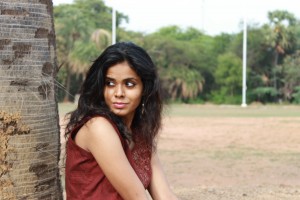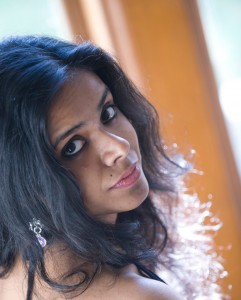‘Who does not want to be a poet?’
Meena Kandasamy is an upcoming poet based in Chennai in the southern Indian state of Tamil Nadu. She writes on women’s themes and on the Dalits, member of the lower castes in India. Her poetry collection is called ‘Touch.” She spoke to DW blogger Roma Rajpal on being a poet and her passion for writing.
Tell me about the book you are working on?
I’ve just finished writing my first novel The Gypsy Goddess. It is a work of historical fiction. It is set in Tanjore district in the South Indian state of Tamil Nadu during the 1960s. It deals with the peasant movement and the beginning of the Communist uprising against caste-Hindu landlords. The incidents in the novel revolve around the first biggest caste atrocity that independent India witnessed, the Kilvenmani massacre on Christmas Day, 1968.
The book is about the heroism of oppressed people who had nothing to lose but their lives. It is also about the pain of living in a caste society, the pain of everyday atrocities of untouchability and the courage of standing up against such injustice. I spent nearly five years just researching and writing this novel.
The story was too close for comfort. My father hails from Tanjore, he was named after a radical Communist leader of his time and to write it was the only way I knew how I could come to terms with my own life, with the questions of where I was from, and what hunger or shame meant to someone like my father.
Writing a novel was never on my agenda, I only saw myself as a poet, as someone responding to life and living with words. It was a very, very painful book to write. I had to reach into another world, the one my father had rigorously sought to escape.
When did you realise you wanted to be a poet?
To be a poet was not as much a realization as a longing. This must have been about twelve years ago, when I was reading all this angry Black poetry from America, Marathi Dalit poetry in translation, the Tamil Sangam poets, every teenage girl’s fixation with Anne Sexton and Sylvia Plath, the love poetry of Neruda or Sappho, and the usual suspect, Shakespeare. Tell me, who in the world did NOT, does NOT want to be a poet?
When did you realise you wanted to be a writer?
I was writing ever since the internet came home someday. A dial-up, and then one is connected to a world where one is free to talk and share one’s opinion. This must have been the late 1990s and I was using funky handles and all the anonymity of the time to write whatever I wanted to write. I eventually published essays, reviews, translations, poetry collections, travelled to festivals everywhere to read my work. It was lovely but the decision to be a writer was taken much later. I had just finished my PhD viva, I had a job teaching English at a university in Chennai, if I kept to the academia, I’d possibly be an Assistant Professor somewhere now. Resigning the job (this was in 2010) was my idea of cutting myself loose, putting myself away from the cocoon of the university and do nothing but survive by writing alone. I’d never have given up these things for anything but writing.
writer was taken much later. I had just finished my PhD viva, I had a job teaching English at a university in Chennai, if I kept to the academia, I’d possibly be an Assistant Professor somewhere now. Resigning the job (this was in 2010) was my idea of cutting myself loose, putting myself away from the cocoon of the university and do nothing but survive by writing alone. I’d never have given up these things for anything but writing.
Why are you so provocative and so angry?
I am angry because there is injustice for thousands of years, and I am provocative because I am asking for a fight. We do not live in a culture where women are treated on par with men, where our concerns are immediately taken up, where society is eager to self-destruct its inequalities and its prejudices. We do not live in a world where women can win recognition as intellectuals or philosophers, where women can be guerrilla leaders and governmental heads, at least it is not so easy for us as it is for the men.
As women, our anger is often treated with condescension, with a carelessness that seeks to delegitimize its existence. The only way to call for a debate, the only way to make our concerns an object of discussion, the only way to articulate our voice, the only way to talk not only of our struggle but also of structural injustice, is to be militant. I design my language to be as raw as it is sharp, as piercing as it is powerful, as clever as it is cutting. I do that to get heard otherwise I will inhabit the silence of my mother and her mothers, brilliant women who were screaming against the system’s failings, but their voices were trapped in their throats, it never reached far enough to bring change.
Why did you decide to go after mythological characters? It is a very revolutionary challenge you have taken upon yourself.
As a poet, I was channelling what Anne Sexton did in Transformations, what Carol Ann Duffy does in The World’s Wife, what Margaret Atwood does in several of her poems. So, there was a tradition within English poetry of reimagining myths and fairy tales and rewriting them. On one level, it is simple because you are challenging the oppression within your culture and language and religion, and you are backed up by the courage that others before you have dismantled the myths.
Interview: Roma Rajpal
Editor: Manasi Gopalakrishnan







